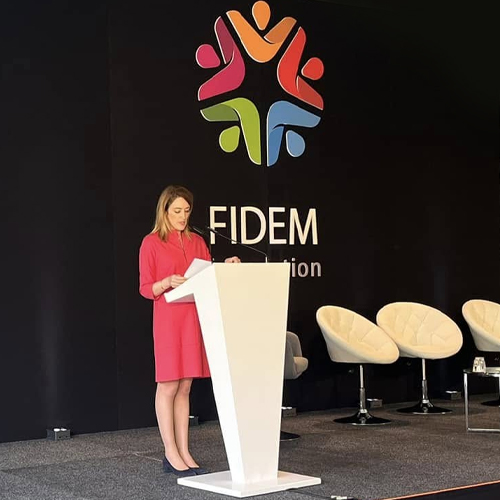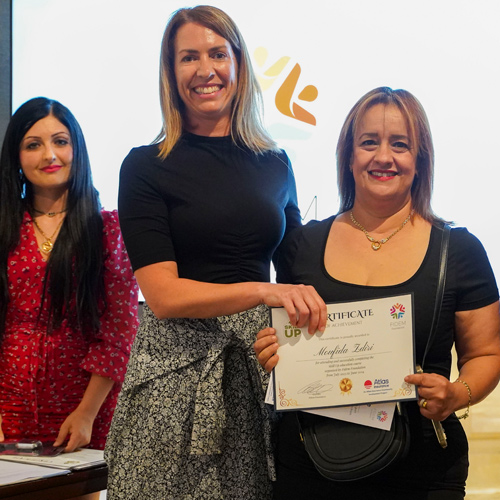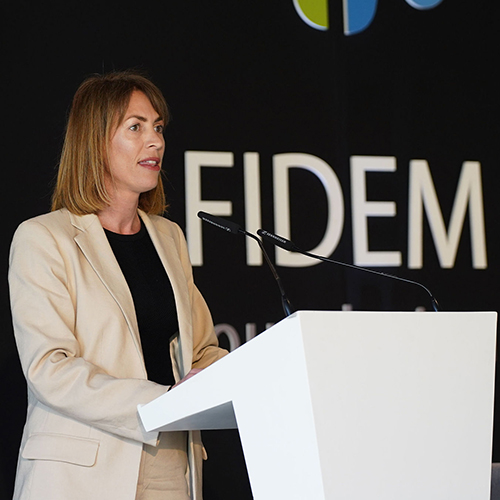We dreamt it. We planned it. We gathered. And we discussed. Now we need to take action. This year, International Women’s Day was a watershed moment for Fidem Foundation, for women in Malta and for society in general. After too many distressing headlines of domestic violence and abuse, after too many stories of gender-based prejudice, after too much frustration about the gender pay gap, after too many “why” it was time to ask: what now? How? When? Who? Us. That’s who.
We took the reigns and brought everyone along with us. When Fidem Foundation was first launched in 2018 its aim was to educate and empower vulnerable women and children. We soon got inundated with requests to assist women escaping domestic abuse. We offered them a tangible, effective lifeline by giving them access to education. We were aware that many women were trapped by their controlling abuser, most often their husband or life partner, because they did not have the financial independence to start a new life away from him on their own. The issue, in most cases, was education. Many had left school without any certificates or qualifications, others were not allowed to finish school, some were barred from working or had any attempts to work or train sabotaged by their abuser. Fidem stepped in by giving them access to education, by empowering them to rise like the proverbial phoenix and reinvent themselves.
After five years of working with countless women and adolescent girls, it was time to expand the discourse to involve everyone else because this is an issue that affects us all, directly or indirectly. It is not just our moral obligation to ensure everyone has access to education, fair employment and a life free from prejudice or abuse, it is also an economic one.
This is why Fidem decided to bring together experts across the gamut of society, from educators to employers, academics, sociologists, law enforcers, trade unionists, psychotherapists, and human resources professionals under one roof to share ideas, discuss our concerns, perhaps offer solutions to a complex wide-raging issue. This was not another talking-heads event. It was an opportunity for involved, dynamic debate with all interested parties. We knew our invited speakers and panellists were up for the task but what we did not expect was the overwhelming response from the attendees. As we kept increasing the number of chairs in the run up to the conference, we realised there was a hunger for such debate, a real need to come together and take stock, a desire to instigate change, a hope to give our daughters and sons a future built on true equality and respect.
Education, Employment, Female Empowerment
The discussion started from the very foundation of society - education. It is the key to achieving gender equality and the empowerment of women but how do we bridge the gap between education and gainful employment and gender stereotypes? As Prof. Josann Cutajar, associate professor, Gender and Sexualities in the Faculty for Social Wellbeing at the University of Malta, pointed out in her introductory speech, educating girls is “smart for all of us”. She added that when a girl receives an education she has the real opportunity to break the cycle of poverty in just one generation. But that is seemingly not enough. It is not just a matter of educating girls and boys, they need to also have an equal chance at the same employment opportunities. A dearth of males in “seemingly feminised sectors perpetuates the view that these jobs are for women”. It gives boys the idea that men can’t do certain jobs which are considered “too soft” such as teaching or social work which carry the double stigma of offering low pay and low prestige. “More male teachers and social workers are needed for psychological, social, organisational and societal reasons,” Prof. Cutajar argued. “Their presence allows children to observe men who are non-violent, who have positive interactions with women.”
Rachel Attard, head of media and communications strategist at The Malta Chamber, reiterated this point in the panel discussion that followed. “Soft skills need to be transmitted to our kids. Men have them too so why don’t we enhance them at a young age?” She questioned if the education system was simply ticking the boxes of the curriculum rather than preparing boys and girls for real life later, noting that students often leave school without the necessary basic skills that the industry truly needs. The President of the Malta Chamber, Marisa Xuereb, pointed out that “this skills shortage was not just a woman problem - education is not keeping up with the skills required.”
Perhaps this is nothing new to many of us. We’ve all heard it before but could this be the time when finally someone in that room will take notice and get the ball rolling for the much touted change in the education system we’ve all been promised? Is it too much to expect?
As the debate moved on to gender stereotypes in employment, Maria Loumpourdi, Head of Talent at Betsson Group, noted how “women are expected to be both masculine and feminine at the same time. We need to challenge our own conscious bias but also need to point out bias. We need to have the courage to point out gender bias.”
It was a revelation to listen to the stories of women who have had the courage to break through that gender bias and forge a successful career in male-dominated environments. Ing. Sarah Farrugia was addressed as “Sur” for quite some time before her male colleagues learnt to adjust to the female version. She revealed girls often express surprise when meeting a female mechanical engineer. “Yes, I’m real. This is what an engineer looks like,” she quipped. The students who were invited to attend the conference all sat up straighter at that point and their eyes suddenly shone brighter. And I bet you never knew that a woman could be an undertaker? Her name is Mirann Sapiano and she is also a qualified pharmacist. Oh, and a mother too, not that it should be of any consequence in her career choice. However, Mirann did stress the importance of having a support system around her to help her achieve her goals.
Domestic Violence and Sexual Harassment at Work
FIDEM service user Redianne Cassar was the undisputed star of the morning as the second part of the conference got underway. She wishes it weren’t so. While she generously and candidly shared her harrowing life story of abuse at the hands of her former husband, she would have preferred she had no such story to tell in the first place.
“I never realised I was a victim of domestic violence,” she began as the room grew silent. Her message to all victims of abuse was clear: “Why should anyone leave? You leave for the children. You don’t stay for the children. You don’t want to go through this. If they’ve seen it (happen) end it. You leave to close. You leave to flourish. You leave to give yourself a better chance at life that you deserve. You leave to give yourself a chance at love but the first love you should be looking for is the love for yourself. You leave so that those who love you don’t have to deal with your picture on the headlines of a newspaper saying murder.”
The standing ovation that followed Redianne’s intervention was by far the most memorable moment of the whole day. But we hope that those who stood on their feet to clap will not just remember Redianne’s courage, they will also remember the horror and pain that she endured, the inexcusable frustrations she faced as she waited interminable long months for court cases to be heard while still living with her abuser, the manipulative brainwashing she was subjected to when she was made to believe she “deserved it”.
Redianne is a survivor, a success story but there are far too many women like her who are still trapped, who are still suffering, who need our help. “Domestic violence is all about power and control,” as Prof. Marceline Naudi from the Faculty for Social Wellbeing explained. In the panel discussion that followed, Elaine Compagno, general manager at Women for Women Foundation, drove the point home: “We need to be believed, we need to be protected, we need to be empowered and perpetrators need to be properly held accountable.”
If the statistics about domestic violence weren’t horrific enough, the figures for sexual harassment at work are equally distressing. Three out of four women in Malta are sexually harassed at work. And given that this remains an under-reported crime, it is safe to assume that the real figure could be much higher. “Sexual harassment at work is a crime and a form of discrimination and violence. It is never cost neutral to the victim,” argued Dr Anna Borg, senior lecturer at the Centre for Labour Studies. “Employers need to have an adequate sexual harassment policy in place which is well implemented.”
Perhaps the final comment from the last panellist of the day Bernie Mizzi, the director of Chiswick House School and St Martin’s College, summed it all up: “We need a re-imagining of our curriculum in senior school. And we need to take collective and personal responsibility.” She said it.
Presidential messages
Every single one of the speakers and panellists invited to participate at the conference was there because their voices mattered, equally, but we know that some voices carry more weight and are heard louder because of their role and position in society. It is those voices that help us carry our message to those who can, and should, enact the change we need.
In a specially recorded video message, Roberta Metsola, President of the European Parliament, remarked that while female empowerment is important, “once women step over that threshold, it is important that they find the necessary support and crucially the same spectrum of opportunities as men. FIDEM Foundation understands this just like the European Parliament understands it”.
Last year the European Parliament adopted the Women on Board directive which will lead to open and transparent recruitment procedures across Europe and push towards a greater presence of women on boards. She added the EP will push for equal pay provision for equal work and is working on new legislation that require employers to be transparent about the pay gap between male and female workers which currently stands at around 14% across the EU. This summer the EP will also vote to criminalise violence against women and improve access to justice.
“I would like every young girl to grow up believing that the sky is the limit, that her possibilities are endless. Women in politics, in business, in science, in sports, in the arts, in society have changed the world. … A woman’s place is truly where she wants it to be.”
President Emeritus Marie Louise Coleiro Preca closed the event with a few observations that reflected our thoughts precisely: “We’re still far off from where we should be today as women. We need to acknowledge the gigantic leap women have made but we need to address the discriminating culture we live in. And this notwithstanding the fact that we have a body of laws in Malta that should make us proud. We still must strive harder to create a country where women and girls are safe. We need a thorough review of our education system and give priority to changing the culture in a sustainable way. We need to be brave enough to bring about these changes. We need an education system built on respect and wellbeing of all without any prejudice. We are far off from achieving gender equality and equity. It is not a woman’s issue but an issue that impacts on all members of society, an issue of universal fundamental human rights. The gender pay gap issue needs to be addressed by creating quality flexible jobs with the right policies in place, and a change in culture.”
With special thanks to our sponsors who generously supported us throughout this conference: Working Town, Corinthia St George’s Bay, Frank Salt Real Estate, Brown’s, Glitnor Group, Niumee, Salini Resort, Picture Perfect Photography, The Phoenicia Hotel, Midi, and Atlas Insurance.










